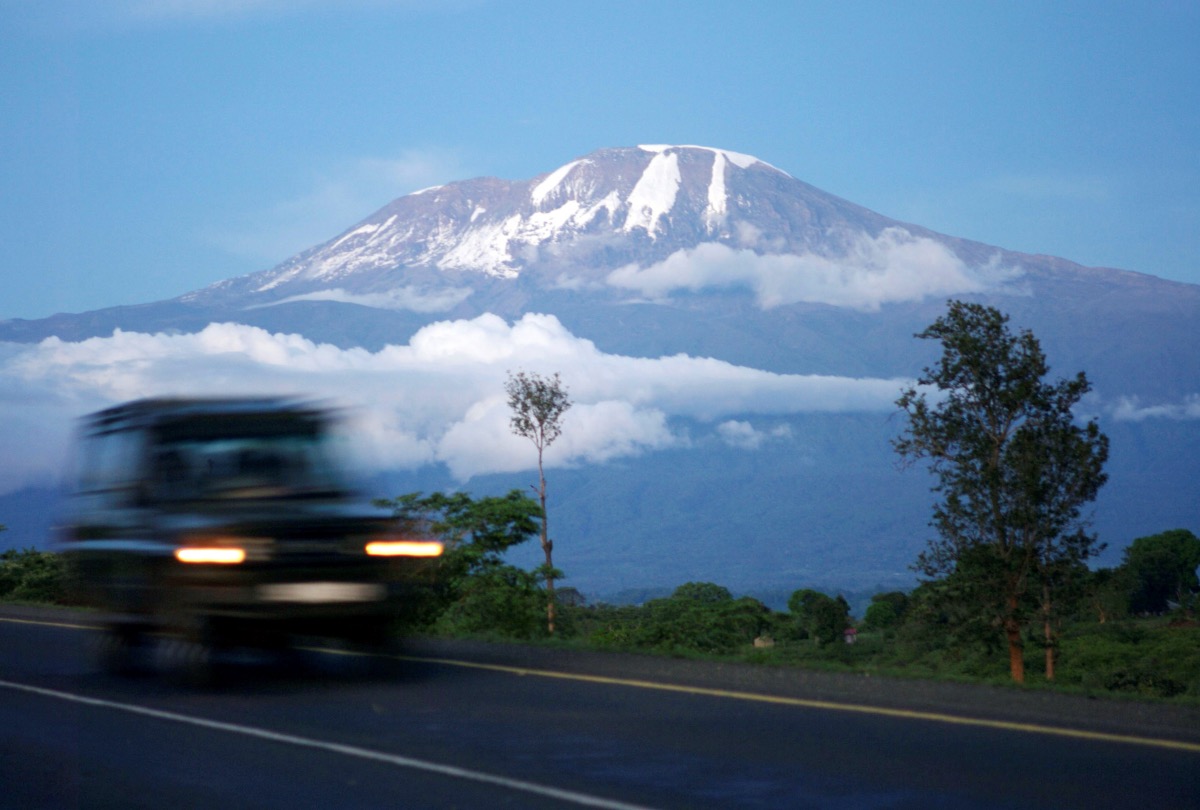Johannesburg, South Africa
Reuters
Africa’s fabled eastern glaciers will vanish in two decades, 118 million poor people face drought, floods or extreme heat, and climate change could shrink the continent’s economy by three per cent by mid-century, the UN climate agency warned on Tuesday.
The latest report on the state of Africa’s climate by the World Meteorological Organisation and African Union agencies paints a dire picture of the continent’s ability to adapt to increasingly frequent weather disasters.

A vehicle drives past Mount Kilimanjaro in Tanzania’s Hie district on 10th December, 2009. At the foot of Africa’s snow-capped Mount Kilimanjaro, images of the mountain adorn the sides of rusting zinc shacks and beer bottle labels, but the fate of the real version hangs in the balance. PICTURE: Reuters/Katrina Manson
The report says last year was Africa’s third warmest on record, according to one set of data, 0.86 degrees Celsius above the average in the three decades leading to 2010. It has mostly warmed slower than high-latitude temperate zones, but the impact is still devastating.
“The rapid shrinking of the last remaining glaciers in eastern Africa, which are expected to melt entirely in the near future, signals the threat of…irreversible change to the Earth system,” WMO Secretary-General Petteri Taalas said in a foreword to the report.
The report came as African countries demanded a new system to track funding from wealthy nations that are failing to meet a $US100-billion annual target to help the developing world tackle climate change.
The demand by Africa’s top climate negotiator Tanguy Gahouma, ahead of the COP26 climate summit, highlights tensions between the world’s 20 largest economies that produce more than three quarters of greenhouse gas emissions, and developing countries that are bearing the brunt of global warming.
“Extreme heat”
The report forecast that at current rates all three of Africa’s tropical ice fields – Tanzania’s Kilimanjaro, Kenya’s Mount Kenya, and Uganda’s Rwenzoris, which are often identified as the location of the legendary Mountains of the Moon – would be gone by the 2040s.
In addition, “By 2030, it is estimated that up to 118 million extremely poor people (living on less than $US1.90 per day) will be exposed to drought, floods and extreme heat…if adequate response measures are not put in place,” African Union Agriculture Commissioner Josefa Sacko said.
Africa, which accounts for less than four per cent of greenhouse gas emissions, has long been expected to be severely impacted by climate change. Its croplands are already drought-prone, many of its major cities hug the coast, and widespread poverty makes it harder for people to adapt.
Apart from worsening drought on a continent heavily reliant on agriculture, there was extensive flooding in East and West Africa in 2020, the report noted, while a locust infestation of historic proportions, which began a year earlier, continued to wreak havoc.
The report estimated that sub-Saharan Africa would need to spend $US30 to $US50 billion, or two to three per cent of GDP, each year on adaptation to avert even worse consequences.
An estimated 1.2 million people were displaced by storms and floods in 2020, nearly two-and-a-half times as many people as fled their homes because of conflict in the same year.
– Additional reporting by ALESSANDRA PRENTICE in Libreville, Gabon.





